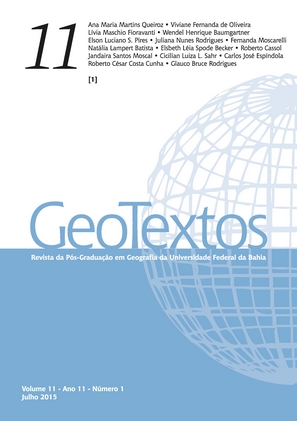THE RECOMPOSITION OF THE SCALES OF GOVERNANCE, STATE AND TERRITORIAL DEVELOPMENT IN BRAZIL
DOI:
https://doi.org/10.9771/1984-5537geo.v11i1.12816Keywords:
Geographical scales, Governance, Territorial development, State, Public policyAbstract
The global process of spatial rearrangement of human actions put in focus new themes and scales of analysis of the territory, such as local and regional, that simultaneous to the scale of the union of countries in blocks, result in opening possibilities for multilevel governance structures, or impose redefinition of the roles of the states. It is in this scenario, that the territory emerges as a source or strategy of political power and economic, of dispute of groups or social classes whom have different interests and often conflicting. In this sense, the theme on State and public intervention is important because it constitutes the scale of phenomena arising from the decisional institutional universe of the political territorially centralized, when growing the importance of the decentralization of state power. The aim of this paper is to show that the recomposition of the scales of global, regional and local phenomena define significant parts for the management of territorial policies, while grow the challenges of cooperation and coordination. Thus, we reiterate here the relevance of the contributions from political geography and institutionalist political economics, analyzing, each in its own way, as how political phenomena and institutional forms are territorialized and cut out significant spaces of governance of social relations, their interests, commitments, conflicts, control, domination and power.Downloads
Downloads
Published
How to Cite
Issue
Section
License
Autores que publicam nesta revista concordam com os seguintes termos:
Autores mantém os direitos autorais e concedem à revista o direito de primeira publicação, com o artigo simultaneamente licenciado sob a Licença Creative Commons Creative Commons CC BY que permite o compartilhamento do trabalho com reconhecimento da autoria e publicação inicial nesta revista. Esta licença permite que outros distribuam, remixem, adaptem e criem a partir do seu trabalho, mesmo para fins comerciais, desde que lhe atribuam o devido crédito pela criação original. É a licença mais flexível de todas as licenças disponíveis. É recomendada para maximizar a disseminação e uso dos materiais licenciados. Ver o resumo da licença em: https://creativecommons.org/licenses/by/4.0/ Ver o texto legal da licença em: https://creativecommons.org/licenses/by/4.0/ Consulte o site do Creative Commons: https://creativecommons.org/licenses/?lang=pt
Autores têm autorização para assumir contratos adicionais separadamente, para distribuição não-exclusiva da versão do trabalho publicada nesta revista (ex.: publicar em repositório institucional ou como capítulo de livro), com reconhecimento de autoria e publicação inicial nesta revista.
Autores têm permissão e são estimulados a publicar e distribuir seu trabalho online (ex.: em repositórios institucionais ou na sua página pessoal) a qualquer ponto antes ou durante o processo editorial, já que isso pode gerar alterações produtivas, bem como aumentar o impacto e a citação do trabalho publicado (Veja O Efeito do Acesso Livre).






